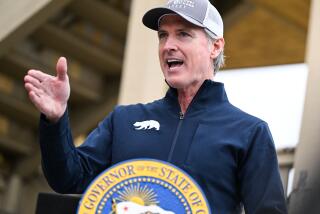Roadblocks and Drunk Driving
- Share via
The last line of my analysis of the unconstitutionality of the sobriety roadblocks (Op-Ed, Jan. 6) contained language that I did not write and that misstates the ACLU position. The version you printed referred to “the tiny percentage of intoxicated motorists on the road,” an inaccurate description of the high number of drunk drivers. My language criticized the roadblocks because of the tiny percentage of intoxicated drivers who will drive into them. JOAN HOWARTH Los Angeles I respect Joan Howarth’s thoughtful and well-reasoned criticism of the “sobriety roadblocks” as being in violation of our Fourth Amendment guarantees. However, I just can’t agree with her.
I have a friend, also named Joan, who was paralyzed from the neck down last year by a drunk driver barreling down the wrong side of the road at full speed in his Cadillac. The months of incredible pain and the permanent damage to Joanie’s life are too real for me to be concerned about the abstract principles behind the ACLU’s opposition to the roadblocks.
I don’t believe that the operation of the roadblocks will set a precedent for the government to intrude further into our lives. We are all stopped and our luggage is X-rayed every time we take an airplane; if we happen to have too much change that sets off the metal detector, we have to empty our pockets at the demand of the security guards. We don’t regard this as an infringement on our constitutional rights. It is an annoyance, but we accept it as necessary so that we can feel safer once on the plane. It hasn’t led to other police abuses.
I will feel safer on the road, too, knowing that the police are trying new methods to curb drunk driving. It will be an annoyance, but I am willing put up with some traffic and a brief discussion with a police officer if it will prevent one more person from being paralyzed like my friend Joanie.
The fact that it may not be the most financially efficient means of stopping drunk driving is unimportant. If it works, and saves just one life, it is worth whatever it costs. BYRON GROSS Los Angeles First, sobriety roadblocks occurred during holidays only. Now, they will be practiced daily. And no longer will their locations be made public.
How long before we forget that the roadblocks are for sobriety checks only? Undoubtedly police will be informing us that such roadblocks have uncovered hundreds of misdemeanors and more.
But at what cost of freedom? They do indeed “hobble us all.”
Lives were lost to gain the freedoms we are now giving up in the hope of saving others. There must be a better way. CHARLES BOCCADORO La Palma Our constitutional right to freedom does not include yelling “fire” in a crowded theater. It also does not include driving in an intoxicated condition.
Sobriety roadblocks, with officers stopping and questioning drivers at random, is one method to discourage unfit drivers.
In an age when 26,000 people are killed in automobile accidents each year, a shocking number of tragedies that usually involve drinking drivers, we need to employ all available methods to get inept drivers off our roadways.
Joan Howarth is correct in stating that few intoxicated drivers are discovered in roadblocks, but the idea that roadblocks are on the streets will discourage some drunk drivers in the same way that walking policemen discourage purse-snatchers and patrolling police cars discourage burglars.
It is inconvenient to be stopped and questioned by a police officer. It is also inconvenient to remember to lock the house and car. It is even infuriating that we cannot walk anywhere at any time because a few people are dangerous.
Driving a car is a privilege and not a consitutional right. An automobile does not have the sanctity of a dwelling. We set standards for drivers and we should let officers have the tools to enforce these codes.
We form our laws to meet the conditions that are in the community and now, at this time when automobile accidents are a leading cause of death, we must direct our regulations toward the well-being of drivers and passengers who all are the potential victims of a small minority. PAT ANDERSON Los Angeles From Joan W. Howarth’s article it would seem that the ACLU has mixed emotions about solving the problem. She says that the ACLU is not protecting drunk drivers and that the ACLU supports aggressive, creative, effective enforcement of drunk-driving laws, and she concludes, in part, by saying: “The effective, constitutionally permissible method to stop drunk drivers is to go out, and look for them.”
If roadblocks don’t do this, I wonder what does?
The Fourth Amendment guarantees our right to freedom from unreasonable search and seizure. It does not prohibit reasonable search and seizure. The matter of roadblocks boils down to this: Are roadblocks reasonable or unreasonable? The majority of people answer: “Reasonable.”
Therefore, roadblocks should not be considered to be unconstitutional. They are a “method to stop drunk drivers (by going) out and look(ing) for them.” They are no more unreasonable than red traffic signals. HASKELL COLLIER Whittier I began reading Joan W. Howarth’s article with pen already in hand, convinced that with logic and eloquence I would tear her argument to shreds.
But I was wrong. You’ve got my vote, Joan: There are better ways to stop drunk drivers. Thanks for the education. RONALD D. HARDCASTLE Los Angeles
More to Read
Sign up for Essential California
The most important California stories and recommendations in your inbox every morning.
You may occasionally receive promotional content from the Los Angeles Times.













